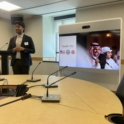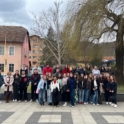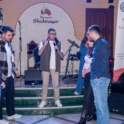Abdulaziz reflects on the highlights from serving as a mentor for CEW.
STORIES
'American-Friendly' and Eager to Learn

This article was originally published in the Voices of NY.
Written by Nancy Bruni and Muhammad Fauzan Omar
Nancy Bruni, who moved to the United States from Taiwan as a child, works at a non-profit organization for arts education and lives in Brooklyn. A mother of two, she is a public education advocate, volunteer and mentor.
When I first sought references to be a host mom to a Muslim foreign exchange student, I detected some unease among my Brooklyn neighbors. They asked, “Is he America-friendly?”
It had never crossed my mind, but now I wondered, what does that question mean?
It’s a question I have continued to mull over since 17-year-old Muhammad Fauzan “Zan” Omar came to live with our family for a semester and experience of life in New York City. Even here in one of our country’s most diverse cities, many New Yorkers remain unsure of what lies in the hearts of Muslims. And that apprehension, I learned, is mutual.
Zan is a Kennedy-Lugar Scholar from the American Council’s Youth Exchange and Study, or “YES,” program. YES was created in 2002 by the United States Department of State in response to the events of September 11, 2001, to offer high school students from countries with significant Muslim populations exposure to life in America, to foster understanding and mutual respect between our countries.
For me, the idea of exchanging kids across the seas – regardless of their religious beliefs – makes sense as our world becomes more connected.
Zan comes from a village of 50 people outside of Segamat, Malaysia, where he grew up surrounded by durian and rubber trees. After arriving here, he quickly settled into life in New York City: adeptly riding the subways, going to American public school, volunteering his time to teach seniors how to use the Internet, and eating everything that we eat – except pork.
Our family has gained a Muslim son. And as a family, we talk about everything and anything, including Zan’s views on the treatment of Muslims in New York City.
The answer to my neighbors’ question is yes – Zan certainly is “America-friendly.” But that answer doesn’t address all the nuances of his experience here, as I discovered when I interviewed him on the subject.
Zan’s written impressions, below, were lightly edited for clarity.
Nancy: What was your first impression of New York City?
Zan: I was lucky to have been selected to come to New York City! This is the place where all my friends dream of coming. The first thing I noticed when I arrived, in January, was how cold it was here, compared to Malaysia where the average temperature is 92 degrees. I was amazed with the number of Malaysians living here, as well as the diversity of people. I am also impressed with the variety of foods here, representing the different populations. Pizza seems very popular here. It is also curious that you use fork and knife to eat, while in Malaysia we use our right hand to eat.
N: What were some of your preconceived notions of America?
Z: Before coming here, I believed America was bad. In our country, we view western culture as having too many freedoms, and the young people here as disrespectful, from the way they dress to the way they address their elders. These freedoms and habits are in direct contrast with our Muslim ways. And, from what we read in the papers, there are a lot of violent crimes in America.
I also believe that western media has portrayed Muslims as a population of radicals who therefore cannot be trusted. These portrayals made me distrust Americans.
But what I thought is not what I see. I notice the ability for people to be individuals here, and how they are able to live peacefully and discuss things openly. In my host family’s neighborhood, people are so polite to each other, and everyone knows each other. And what incredibly talented people there are here! I love the performances in the subways, on the street, everywhere.
I also learned that I must read more than one newspaper and not trust the media 100 percent. Coming here has opened my eyes.
N: Since 9/11, many Americans developed a fear of Islam. They believe that the religion encourages fanaticism. How do you think Muslims can overcome this “bad rep”? And, how do you think we can build trust between American and Muslim students from around the world?
Z: The act of a few bad apples cannot determine the face of a religion. Young Muslims can fight the bad rep by getting our education, doing good, making an attempt to understand the world around us, and showing that we are good citizens. I also will say that it is not religion that makes a person “bad,” it is the individual.
I was confused as to why 9/11 happened, and prior to coming here, I didn’t believe that it happened. The news clips I saw in Malaysia left me wondering if it was made up. Perhaps I don’t want to believe that people of my faith can be capable of such atrocity, because we are about peace and tolerance.
N: Recently, the New York City Police Department came under heat for their surveillance of Muslim students and other Muslims. They declared that the monitoring of Muslim students’ academic, personal, and religious activities are part of the department’s anti-terrorism efforts in keeping New Yorkers safe. How do you feel about that?
Z: I say bring it on. I believe that the Muslim people of the United States should not hide what they are doing. Perhaps the surveillance will show that we are normal everyday people who go to school, work, worship like anyone else. But, at the same time, I feel that it is an invasion of privacy.
N: I was nervous in trying to find a high school for you that would be tolerant, with students who would be accepting. How did the school receive you, and are the students tolerant of your religion?
Z: I study at the High School for Dual Language and Asian Studies, and it is a fine school. The students and teachers accepted me right away. I was really nervous at first, because I didn’t know how they would view Muslim students, but they turned out to be kind and nice, and I made friends easily. No one ever asked if I was a terrorist. (smile)
N: What has been your best experience here?
Z: Since I arrived here in January until today, the best experience has been everything – the city, school and people. I live in an amazing neighborhood, where I am surrounded by artists and talented people. I want to learn how to be a talented person, and improve my English too.
N: What will you say about America and New Yorkers when you get back?
Z: I’d like to tell Malaysians that we cannot judge Americans based on our news or advertisements that we read on the Internet or magazines. We need to go to America and assimilate into their culture in order to understand, so we can know who they really are. I’d like to tell them America is rich with diverse cultures and races, and that they live like anyone would live: caring for their families, sometimes struggling to make a living… We cannot judge Western culture by taking only the bad things like gambling or stealing, because it’s not really their culture. We must learn their whole culture so we can understand them, and vice versa.





